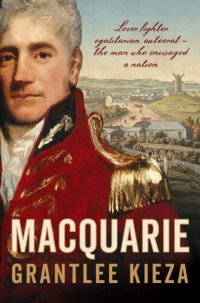
The Father of Australia. LACHLAN Macquarie is the man credited with shaping our country's destiny, transforming the harsh, foreboding penal colony of New South Wales into an agricultural powerhouse. An inscription on his tomb describes him as ‘‘The Father of Australia' and he has lent his name to such institutions as the Macquarie Bank and Macquarie University and places such as Port Macquarie, the Lachlan River and Sydney's Macquarie Street. Mrs Macquarie's chair is a Sydney landmark. He was the first to dictate that all traffic in Australia keep to the left and the first to use the name ‘‘Australia' in official correspondence. He became Governor of NSW after the tumultuous rule of Captain Bligh resulted in mutiny and arrest. Macquarie was born on a remote Scottish island in 1762 and joined the British army as a teenager. His older brother died as prisoner of the Americans in 1778 but Macquarie survived fierce battles in America and went on to serve with the British in Jamaica, India and against Napoleon's forces in Egypt. He was a dashing, handsome frontline soldier and moved in the highest circles in London despite describing himself as an ‘‘awkward, rusticated, Jungle-Wallah.' He became a favourite of Mad King George (George III) and Queen Charlotte because of his courage and intelligence. He was appointed Governor of New South Wales with the blessing of Joseph Banks, who had sailed with Captain Cook to the Great South Land in 1770. Macquarie landed at Sydney Cove in 1809, with his regiment and his second wife, Elizabeth Campbell, his first wife having died of tuberculosis. New South Wales was in disarray after Bligh had been deposed in a military coup but Macquarie ruled for 12 years, opening up its commercial prospects, introducing coins (the holey dollars) instead of barter and despite, opposition from London, creating the Bank of NSW (now Westpac). Under his guidance, the Blue Mountains were crossed, opening up the vast plains west of Sydney and John Oxley explored what is now Brisbane. Macquarie built Parramatta Road and the townships it generated and began great public works with the convict architect Francis Greenway. He encouraged freed convicts back into society, even appointing one as colonial surgeon and another as a magistrate, which put him at odds with free settlers. He corresponded often with Arthur Phillip, who led the First Fleet in 1788 and brought a humanitarian spirit to the treatment of Aborigines, building a school for Indigenous children and an Aboriginal farm. He promoted morality, education and temperance, built schools and shut down pubs but also presided over the first horse races in Hyde Park. He was always in conflict with powerful opponents including the wool baron John Macarthur. Macquarie finally became a father at 52 following Elizabeth's six miscarriages but his joy was tempered by opponents in Britain who saw his great public works as a waste of money in what was supposed to be a remote prison camp. Macquarie returned to England with his family in 1822 and died in 1824, still bitterly clashing with his detractors. In death he was finally lauded as a great reformer and visionary.
Download the book Lachlan Macquarie for free or read online
Continue reading on any device:

Last viewed books
Related books
{related-news}
Comments (0)